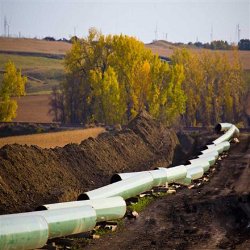It’s still not quite ready to start construction. But the pressure is on.
 The House passed a bill on Wednesday to allow the Keystone XL without presidential approval. This marks the eighth time in the past two and a half years that the House has voted on legislation to push the Keystone XL oil pipeline through Congress.
The House passed a bill on Wednesday to allow the Keystone XL without presidential approval. This marks the eighth time in the past two and a half years that the House has voted on legislation to push the Keystone XL oil pipeline through Congress.
And the 241-175 House vote, dominated by Republicans (19 Democrats joined), is likely as far as it will get.
The $7 billion pipeline, proposed by TransCanada (NYSE: TRP), would carry roughly 830,000 barrels per day of a heavy crude oil called bitumen. The pipeline would travel from the tar sands in Alberta, Canada to refineries along the Texas Gulf Coast.
In all, the 1,700 mile pipeline would cross through five states on its way into Texas: Montana, South Dakota, Nebraska, Kansas, and Oklahoma.
House vs. Senate
The Republican House claims that the administration has had ample time to review the project, one that would create thousands of U.S. jobs and reduce the need to turn to politically unstable suppliers like Venezuela and Saudi Arabia. The U.S. would rely less on OPEC and instead form a greater alliance with Canada. And the price of North American fuel would be driven down, all while boosting the reliance on North American energy resources to meet demands.
The Keystone project has long been sitting on the table. First proposed in 2008, it is likely the most studied pipeline that has ever been proposed. To many, time is of the essence, and this pipeline would be a necessary rejuvenation to the U.S. economy.
This may be the reason why the House is trying to push this bill so hard, and why if passed, it would bypass an approved presidential permit – to help ‘speed things along,’ as they might say.
Critics, on the other hand, believes this bill undermines the Obama administration and is reckless. The line will carry crude that could cause environmental damage should it leak.
But the president has been delaying any decision on the Keystone XL for quite a while. The company has updated the safety features and rerouted the pathway. Even the state of Nebraska – the state that initially opposed the pipeline’s route through the state – has ultimately approved the new route.
Still, the Senate, where Democrats reign supreme, will likely not considering this legislation. And the Obama administration already threatened to veto the bill should it be passed.
Oh, Canada
The State Department holds jurisdiction over the Keystone Pipeline XL because it crosses the Canadian border.
And it’s Canada that would gain from the benefits of the construction of the Keystone XL. Canadian Prime Minister Stephen Harper has long urged President Obama to get on board with the project.
There is the oil industry on one side and environmentalists on the other.
And then there’s Canada champing at the bit. Canada’s oil production has grown by leaps and bounds since the pipeline was first proposed in 2008. If it gets rejected once more, there’s no doubt that U.S.-Canada relations will be strained.
The lack of a pipeline from Canada to the U.S. has caused Canadian crude oil prices to fall sharply. It is estimated that the Alberta government has already lost billions in potential revenue.
At the end of the day, the Canadian economy isn’t flourishing the way it should be, and like it or not, a lot is riding on this one pipeline and the decisions made in Washington D.C.
Our analysts have traveled the world over, dedicated to finding the best and most profitable investments in the global energy markets. All you have to do to join our Energy and Capital investment community is sign up for the daily newsletter below.
The U.S. Delays
But the U.S. is held back by pressure from environmental groups. Environmental groups like 350.org and the Sierra Club have lobbied over the issues of climate change; other groups do the same for wildlife.
The bitumen that comes from Alberta’s oil sands is more difficult to extract and uses more energy than conventional production. And these groups fear the threat of an oil spill.
But a draft report by the State Department released this spring concluded that the project was unlikely to cause any significant environmental impact. It also stated that not building the pipeline would contribute a more significant environmental threat, as transport would then be used by truck and rail – creating a more damaging effect on the climate.
The U.S. Environmental Protection Agency states that the report still isn’t thorough enough. A second draft is expected this summer.
There is a tremendous struggle from both sides of the Keystone Pipeline XL.
And it’s only just begun…
If you liked this article, you may also enjoy:




